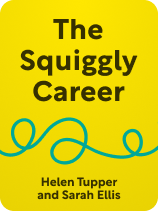

This article is an excerpt from the Shortform book guide to "The Squiggly Career" by Helen Tupper and Sarah Ellis. Shortform has the world's best summaries and analyses of books you should be reading.
Like this article? Sign up for a free trial here.
How effective are you at building meaningful professional relationships? What if you could learn how to create a network that propels your career forward?
Knowing how to build a professional network is a crucial skill for career success. This entails creating mutually beneficial relationships with people who can offer advice, mentorship, and opportunities. These connections can provide diverse knowledge, perspectives, and potential career advancements.
Read on to discover expert tips on how to strategically grow and leverage your professional network for long-term success.
Build a Professional Network
Tupper and Ellis’s fourth skill for succeeding in a nonlinear career is the ability to network. Networking is building a social web of people who offer mutual benefits—they help you build your career, and you do the same for them. This can be by providing advice, mentorship, skills, other connections, and so on. They share advice on how to build a professional network. First, they explain why networking is important.
First, strong networking skills help you to build meaningful relationships with people. This is important because having a smaller network of close connections who are willing to help you is more effective than a large network of loose connections that you can’t leverage. Second, your network will provide a diverse web of knowledge and perspectives that help you develop your career and branch into new territory. Third, networking helps you spread your name—the more that people know you, your goals, and your talents, the more opportunities will come your way.
(Shortform note: In Never Eat Alone, Keith Ferrazzi also emphasizes the crucial nature of networking. In addition to the benefits discussed by the authors, Ferrazzi explains that another important benefit of networking is that it improves your public image—it makes other people think positively about you. In particular, having a reputation for being well-connected will make you popular and influence more people to want to join your circle. You’ll also be seen as having good social skills, which not only makes people like you but is a sought-after professional skill.)
The authors provide a few recommendations to build your network.
First, be calculated when deciding who you build relationships with. You can only keep up with a certain number of people, so it’s crucial that the people you let into your network are highly valuable to you. To ensure your network is intentional, identify the skills and benchmarks you need to meet to achieve your goals and seek relationships with people who can help you.
One way to do this is by considering what you need to reach your goals in three areas: your current job, your future career, and your personal life. You should seek out people with the specific experience, knowledge, or connections that you need to progress in one or more of these areas. For example, if you’re interested in transitioning into a new industry for your future career, look for someone with experience in that industry who can give you advice or help you build more connections in that area.
(Shortform note: In Never Eat Alone, Ferrazzi also emphasizes the importance of having a network of meaningful contacts rather than shallow connections. To ensure this, he says that you should build a social network that includes four groups of people: people who can help you meet specific goals, mentors, people with a large network who can share their contacts (super-connectors), and people who are well-known and share their insider knowledge and clout with you. As long as each person in your network falls into one or more of these categories, you’re guaranteed to have numerous people who can help you with your personal life, current career, and future career.)
Further, once you have a network, the authors note that it’s important to use it. One way to do so is to share your skills and interests with people, and ask if they have recommendations or connections that may be of use to you—even if they don’t in the moment, they’ll think of you if something does arise in the future and spread your name to others in relevant situations. This will attract more opportunities back to you. You can also start a side project that will help you develop your skills and ask one of your network members to help you.
(Shortform note: Under Ferrazzi’s framework in Never Eat Alone, this is the type of conversation you’d want to have with your super-connector contacts. He notes that there are a few types of super-connectors whom you’d especially benefit from having this discussion with—for example, headhunters, political lobbyists, journalists, or social media gurus. These people are guaranteed to know many people in many disciplines who they can connect you with.)
Finally, write Tupper and Ellis, be sure to find ways for your network to benefit from you so the relationship is mutual. Sharing your skills is one way to do this—once they know your expertise, people can ask for assistance when it’s relevant. You can also directly ask people what you can do to help them.
| How to Request Benefits and Give Them in Return In Never Eat Alone, Ferrazzi explains that super-connectors are the best types of contacts to ask for opportunities and connections. In particular, he discusses a few types of super-connectors that are especially beneficial to have in your network and the types of benefits you can offer them to ensure the connection is mutual. For example, headhunters are a great super-connector to have in your network—to ensure the connection is mutual, you can provide them with business leads and connect them to valuable people you know who need a job. Social media gurus are another great super-connector to have—to ensure the connection is mutual, you can share their content on your feed. |

———End of Preview———
Like what you just read? Read the rest of the world's best book summary and analysis of Helen Tupper and Sarah Ellis's "The Squiggly Career" at Shortform.
Here's what you'll find in our full The Squiggly Career summary:
- How the nature of work and career paths has changed dramatically since the early 2000s
- The five abilities workers need to succeed in today’s environment
- Why climbing the corporate ladder might not be for you






